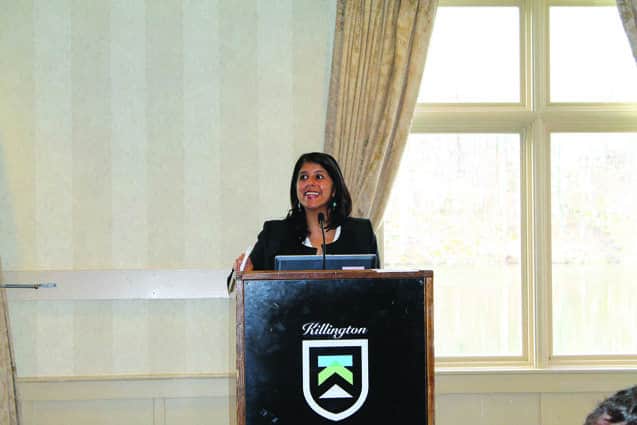By Christopher Biddle
KILLINGTON — Addressing the root causes of poverty and hunger was the primary focus of the 2016 Hunger Action Conference, organized by the Vermont Food Bank and hosted by the Killington Grand Hotel on Friday, May 6. The conference attracted just under 300 attendees and featured a keynote address by food rights activist Smita Narula.
The Vermont Food Bank has three locations in Vermont, including a new facility in Rutland. It works with 225 network partners, programs such as homeless shelters, satellite foodshelves, senior centers, and school lunch programs.
In an interview at the event, Judith Stermer, the Vermont Food Bank’s director of communication and public affairs, said that last year they served 153,000 individuals, which is about one of every four Vermonters.
Stermer said that that the Vermont Foodbank has been holding this annual conference for nine years. The day-long event included workshops and seminars led by representatives from various food security and public health organizations, including the Vermont Coalition of Clinics, Children’s HeathWatch of the Boston Medical Center, and the Vermont Community Foundation. Their presentations ranged from leveraging federal and philanthropic funding to fight hunger, to ideas for making a food shelf more user-friendly and attractive, to fighting hunger by practicing good health.
“It’s traumatic to be in poverty,” Vermont Food Bank’s Chief Executive Officer John Sayles told The Mountain Times. “It’s a crisis every single day, and you can’t be a contributing member of society, and a good student, and a good worker and a good husband, wife or parent if you’re in crisis every day. So part of our job is to relieve some of that crisis for people.”
Stermer said that another part of their job is to work with organizations that are helping to address systemic conditions that lead to those crises. “We know that people aren’t hungry in Vermont because there isn’t enough food,” said Stermer. “It’s about the distribution of wealth.”
Angela Berkfield of ACT for Social Justice, and her husband Richard Berkfield, of Food Connects led the workshop, “Getting at the Root: What Causes Poverty and Hunger.” They showed a video by Politizane based on polling data by Mother Jones that illustrates and compares the public’s perceptions of wealth distribution, and their ideal projection vs. the reality of the situation in America. One of the facts attendees learned was that 1 percent of the U.S. owns 40 percent of its wealth.
Smita Narula is a Fellow in Human Rights and Public Policy at the Roosevelt House Public Policy Institute at Hunter College, and a former legal advisor to the U.N. Special Rapporteur on the right to food. According to Chris Meehan, the Vermont Foodbank’s cheif community impact officer, Narula talked about food as a basic human right. “People have been put in poverty. They’re not just in poverty. They’ve been put in poverty by some of the social policies that are in place.”
John Sayles summarized: “Her message to us was we need to empower people, let them know what their rights are, and how to exercise those rights…really it’s about supporting families so that they can take the steps they want to,” he said. “We have to be really aware that we’re not just helping people get by to the next day, but we’re giving hopefully a platform from which they can live a life well-lived.”
Annual conference addresses root causes of poverty




